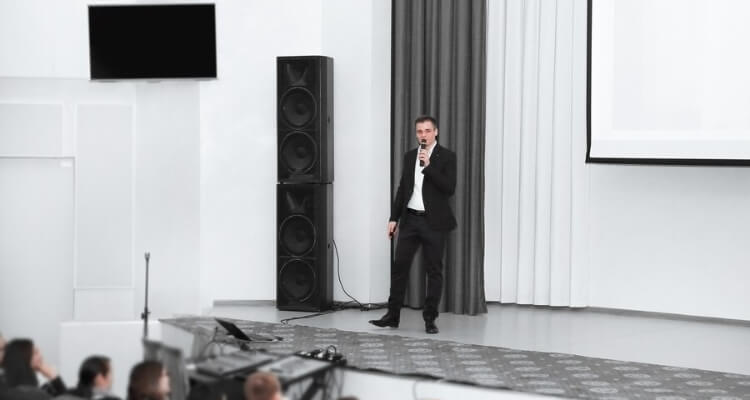Selecting a keynote speaker for your conference is a very important choice, capable of either promoting or fragmenting the triumph of your event. The keynote speaker wields the power to establish the atmosphere, convey the central message, and ignite inspiration within the audience, propelling them toward decisive action.
In this context, the question arises: Do you need a keynote speaker for your conference?
As the veritable linchpin of your event’s resonance, a skilled keynote speaker possesses the capacity to encapsulate themes, captivate attention, and infuse the gathering with renewed vigor.
In the subsequent exploration, we will explore the manifold advantages of securing a keynote speaker and decipher the transformative impact they bestow upon conferences.
A Quick Look at the Keynote Speakers
In conferences, keynote speakers play a very important role in shaping the event’s trajectory and impact. These accomplished individuals bring expertise, charisma, and unique insights to the stage, leaving a lasting impression on attendees.
To ensure the most successful conferences, event hosts meticulously select top-notch keynote speakers. This is because keynote speakers set the tone, bringing energy into the audience and sparking engaging discussions.
Their compelling narratives transcend conventional presentations, allowing effective listeners to ponder, react, and imbibe the core message. By distilling complex ideas into relatable stories, keynote speakers foster an environment of motivation and action.
Do You Need a Keynote Speaker for Your Conferences?
Conferences bring people together to exchange ideas and ignite inspiration. Yet, is a keynote speaker always essential to achieve this? In today’s diverse event landscape, only some conferences mandate a keynote speaker. Some forums thrive on panel discussions, workshops, or participant interactions alone.
However, a compelling keynote can transform the event’s energy, offering a singular vision or thought to rally around. A keynote speaker does more than just share knowledge. Their narrative can bridge diverse themes, providing a cohesive thread for the entire conference. They often possess the charisma to invigorate attendees, sparking engagement and subsequent discussions.
The decision ultimately rests on the event’s goals. A keynote might be invaluable if the aim is to challenge perspectives or introduce groundbreaking concepts. Otherwise, alternate content formats could equally captivate your audience.
Why a Keynote Speaker is Necessary for Conferences?
The essence of conferences lies in imparting knowledge and spurring motivation. Central to achieving this often stands a keynote speaker.
Setting the Event’s Tone
A keynote speaker plays a pivotal role in determining the event’s overall ambiance. Their speech’s direction influences subsequent sessions. Attendees’ engagement often reflects the keynote’s effectiveness.
Offering Unique Insights
Keynote speakers often bring exclusive expertise or perspectives. Their narratives weave personal experiences with universal truths. This synthesis delivers unmatched depth to a topic.
Driving Engagement
When a keynote speaker takes the stage, a collective anticipation fills the room. This unified focus fosters networking and mutual discussions post-speech. A riveting keynote can resonate throughout the conference.
Establishing Credibility
Featuring a respected keynote speaker elevates a conference’s stature. It showcases a commitment to quality content and discourse. Attendees often recognize and appreciate the endeavor for excellence.
Inspiring Action and Change
Powerful keynotes don’t just share information; they inspire transformation. The speaker’s passion becomes infectious, motivating attendees. Consequent sessions might witness increased participation and enthusiasm.
Qualities to Look for in a Keynote Speaker
Identifying the perfect conference keynote speaker is an art shaped by understanding specific qualities that resonate with the audience. A keynote speaker can elevate the essence of any event. Their qualities greatly influence the impact of their message.
Expertise in the Subject
Speakers should be authorities in their field. This depth ensures that they provide authentic and updated information. Audience trust is bolstered when the speaker’s expertise is evident.
Charismatic Presence
Beyond mere content, presentation plays a very important role. A speaker with charisma can grip an audience’s attention. This trait ensures attendees remain engaged, receptive, and inspired.
Adaptability
Not everything goes as planned in live events. The best speakers can adjust to unexpected hitches or feedback. Their ability to pivot showcases professionalism and preparation.
Storytelling Skills
Dry facts seldom inspire; stories do. An adept storyteller weaves data into relatable narratives. This technique enhances understanding and creates memorable conference moments.
Relatability
Speakers should strike a chord with their audience. By showcasing their human side or personal anecdotes, they bridge gaps. This connection ensures a stronger resonance of their message.
Cultural Sensitivity
In diverse gatherings, understanding varied backgrounds is paramount. A speaker who respects and acknowledges different cultures can foster inclusivity. Such sensitivity enriches the discourse and widens appeal.
Strong Communication Skills
A message is as effective as its delivery. Clear articulation and concise expression ensure the audience grasps key points. This quality guarantees the essence of the talk remains intact and memorable.
Steps to Finding The Perfect Speaker For Your Conference
Locating the ideal speaker is like finding a keystone for your conference’s success. This guide simplifies that crucial journey.
Step-1. Define Your Conference’s Objective
Begin by crystallizing your event’s primary goals. Are you aiming for educational enlightenment, motivational boosts, or industry-specific insights? Understanding this shapes your speaker search direction.
Step-2. Research and Shortlist Candidates
Dive into potential speakers who align with your theme. Check their previous talks, publications, or social media presence. Shortlisting based on relevance and audience appeal is essential.
Step-3. Check Availability and Budget
Approach your shortlisted candidates to inquire about their availability. Concurrently, determine if their fees align with your budget. This step ensures feasibility before diving deeper.
Step-4. Assess Previous Performances
Before finalizing, view their past presentations. This provides insights into their style, content, and audience engagement level. Select speakers who match your desired impact and energy.
Step-5. Gather Feedback from Past Engagements
Reaching out to previous event organizers offers valuable input. They can share feedback about the speaker’s professionalism, adaptability, and audience reception. Such firsthand accounts often reveal more than promotional content.
Step-6. Facilitate a Pre-Event Meeting
Engage in a dialogue with your prospective speaker. This allows both parties to align on content, expectations, and event logistics. Clear communication at this stage can prevent potential hitches.
Step-7. Confirm and Contract
Once satisfied, move to formalize the agreement. Ensure all logistical, content, and financial aspects are clear in the contract. A well-drafted deal safeguards both parties and ensures a smooth event.
Step-8. Promote the Speaker
Make an announcement about your keynote speaker to generate interest in your conference. Share snippets of their previous talks or write-ups. Engaging promotional material can boost ticket sales and attendee enthusiasm.
Step-9. Prepare for Contingencies
Always have backup plans. Whether it’s technical glitches or unforeseen circumstances, being prepared safeguards the event’s success. Collaboration with the speaker on this ensures a seamless experience for all.
Bottom Lines
Organizing a conference can often result in overwhelming decisions. One recurring question for organizers is, “Do you need a keynote speaker for your conference?” While it’s undeniable that keynote speakers bring a unique charisma, setting the tone and providing a cohesive thread for the entire event, you should analyze the specific goals of your conference.
If the primary aim is to challenge perspectives, introduce groundbreaking concepts, or inspire action, then a keynote speaker could be an invaluable addition. On the other hand, if the objective leans more towards workshops, participant interactions, or panel discussions, you might achieve the desired impact without one.








